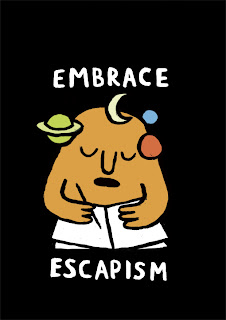Many of you left comments on Part 1 when I asked you why you thought science fiction and fantasy were so adored, even by those who don't necessarily call themselves geeks or nerds. Today, for my 10th post of this blog, I'd like to discuss another reason found in many of these comments: escapism.
 |
| 'Nuff said. |
Essentially, what you need to know about the escapist nature of science fiction and fantasy is this: some people think these books are no more than scribbles on pages to help divert your attention from real-world issues, and other people think these books are helpful specifically because they show you the real world from a new perspective. My thoughts? The latter couldn't be more correct.
Sure, there are many of us who do take guilty pleasure in picking up a less-than-Pulitzer-Prize-winning romantic fantasy romp just for the fun of it. There are also those of us who felt like we could live "normal" lives only within the science fiction worlds we discovered. However, many of us recognize the implicit nature of science fiction and fantasy to take us outside of ourselves, outside of our limited viewpoints, to illuminate the issues, hypocrisies, and ideas in the world around us that we are not otherwise aware of or may not otherwise have been open to hearing. Because of this, we are terrified at the concept of an Orwellian-inspired government that uses Newspeak to convince its citizens of its ideas regardless of morality (or are we there already?). We cheer for Sam and Optimus Prime in their fight to save humanity, because they have shown us that we humans have immeasurable value. We also ache to see the love and acceptance Harry finds with Ron and Hermoine radiated into our suffering, spiteful Muggle world. This is why escapism is not just a quick little vacation for our minds; if anything, escapism engages our minds to think even more deeply about our everyday routines, and how the larger forces at work behind those routines may ultimately be driving us towards a life of slavery or a life of freedom.
As these genres start to become more popular and therefore more widely accepted (and more often than not, their fans seen as intuitive instead of "geeky"), people formerly opposed to science fiction and fantasy on the grounds of unreal escapism seem to be questioning their assumptions. Maybe these "escapist" books really do hold more value than previously suspected. Maybe there's a real-life, applicable reason four out of the five top-grossing films of all time are science fiction or fantasy.
Maybe science fiction and fantasy can help us escape and then come back to change the world.






